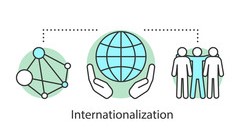Despite the growing interest in the role that collaborative networks have on the internationalization of companies, and the relevance of family businesses not only in Spain but also throughout the world, little is known about the role that collaborative networks play in the process of internationalization of family businesses.
Family businesses have their own characteristics (family capital, long-term orientation, risk aversion, etc.) that can condition their exit to international markets and their behavior in them, as well as influence the decision to join or not join collaborative networks, understood these networks as the business relationships between two or more parties, in which each exchange relationship is between companies that identify themselves as collective actors.
The research carried out for a sample of Spanish family businesses confirms that there is a positive influence of participation in different types of collaboration networks on the exporting status of family businesses, that is, belonging to collaborative networks facilitates the decision to export in family businesses. In this sense, collaborative networks act as a mechanism that contributes to solving problems related to the internationalization process of the company, both financial, information and organization problems ... as well as issues related to the market or the industry to which they want to export. Thus, social capital, which includes all those relationships between individuals or between organizations, facilitates collaboration between companies and can be critical in the internationalization process of family businesses, especially in the early stages. Through their participation in collaborative networks, family businesses can cover some of their weaknesses derived from their own characteristics (family capital, long-term orientation, aversion to risk).
However, the effect of collaborative networks differs depending on the export intensity of the company. The results obtained indicate that belonging to collaborative networks has a greater influence when the company has a low export intensity. On the contrary, in those organizations with a higher degree of internationalization, the effect of collaborative networks is less. In other words, in the early stages of the internationalization process, membership in collaborative networks favors the internationalization process of the family business, but as the company increases its export volume, the effect of collaboration with other companies gradually loses its influence. This may be due to the fact that as export intensity increases, the commitment required to be part of collaborative networks is greater and family businesses limit their participation in new collaborative networks that present a greater international orientation and require greater commitment. Furthermore, the fact that the effect of collaborative networks is diluted in the more advanced stages of the internationalization process may be due to the fact that family businesses generally settle comfortably in local networks where they have already built relationships of trust, and because of their interest in maintaining control and preserving socio-emotional wealth, they limit their participation in other networks that require greater international orientation.
Summary of the article published by the authors in:
Serrano, R., Acero, I. and Dejo-Oricain (2021): Collaborative networks and export intensity in family firms: A quantile regression approach; European Journal of International Management, Vol. 15, Nos. 2/3, pp. 484-509.
Authors: Isabel Acero Fraile, Natalia Dejo-Oricain y Raúl Serrano.
(The opinions expressed in this article are the sole responsibility of the author)




